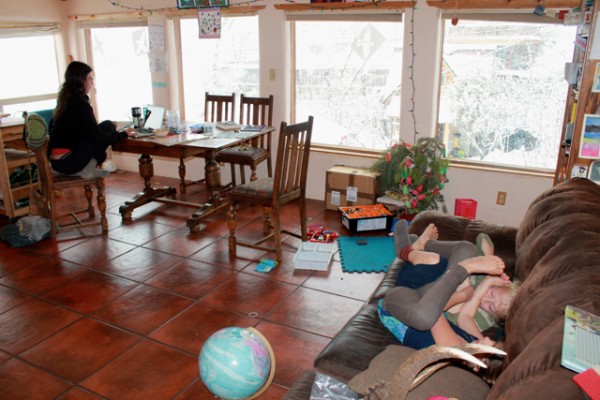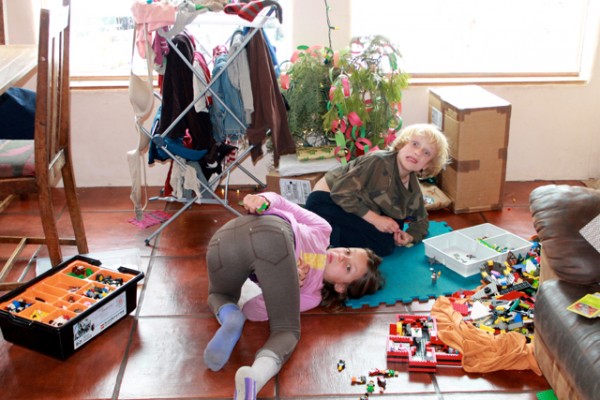All I want for Christmas
It is five days before Christmas and we’ve just returned from dinner at a friend’s house. We’re all full of pasta and friendship and Christmas lights twinkling across our windows. The cold darkness outside transforms our 800 sf into a holy haven every night. “It’s so good to be home!” I’m likely to say after a full 1.86 hours out of the house. Rose grabs her rat and we settle down on the couch to read a little about the Manhattan Project.
“Mama?” Rose interjects just as we’re getting to the first atomic bomb test, so suspenseful it reads like a Stephen King novel.
“Yeah?”
“I’m feeling jealous about not having a lot of presents under our tree. It’s not like at some people’s houses where they have SO MANY presents. They can just write a list to Santa and then their parents have to get them everything on the list!”
“Oh honey – did you notice some houses full of presents recently?”
“Yeah. And we don’t have that many.”
I scroll through all my possible responses, the explanations, the reassurances, the advice-giving, none of which actually say: I hear your pain. (And sure, we can minimize children’s pain when it comes in the form of jealousy for stuff, but I can remember having dinner at a friend’s beautiful, spacious house this summer and coming home to my bitty kitchen and feeling distinctly envious).
Rose is listing off the houses where presents surround trees like a moat. And admittedly, there is a part of me that has a slight agenda for both of my children to be the next Dalai Lama. So, when I see the humanness of their greed, jealousy, competitiveness and anger, I can feel fearful, or disappointed that their Bodhisattva training is not quite complete. And yet, could you imagine if in your pain, a friend reminded you of how un-saintlike your thinking was?
I have no idea what’s happening here.
An empathetic response:
I choose to respond to Rose with pure empathy, knowing that just being understood helps us move through challenging emotions. Empathizing doesn’t mean you agree, just that you can see someone’s position and want them to know they’re heard, which can create just a little bit of space between ourselves and the feeling.
“Oh Rosie, can I hug you? It must be hard to see houses where Christmas is a really big holiday, where so many presents surround the tree. You can imagine all those cool things wrapped up that you might like to receive.”
I reach for her and she stiffens.
(Col realizes that book-reading is temporarily on hold, grumbles and gets up, but he gets the message that in this family, there is always time to work with difficult feelings, even at…sigh, bedtime, as often is the case. My hope is that as Col and Rose get older they will always make the time to work with their own difficult feelings rather than turn to all the numbing/distracting/pleasurable things that American media suggests instead).
“Why can’t we just do Santa?” Rose asks.
“That’s not a tradition that felt right to me and Daddy. But I can see how it sounds like such fun to write a list of what you want and just have it appear. Does that sound so awesome?”
“Of course.”
“And, do you like the idea of watching those presents build under the tree?
“Yeah.”
“You feel like you’re missing out.”
She nods.
“I can understand that, honey.”
I can tell Rose is starting to feel better because her muscles relax and she sinks into me. I squeeze her and ask if she wants to talk about solutions. We generate some potential solutions for next year, none of which involve buying more things. Ideas: wrap everything hyper-individually (each colored pencil? Oy!) so there are more presents under the tree; save some Hanukkah gifts for Christmas; wrap some utilitarian things that we have bought for them anyway (socks, mittens) so there are more presents under the tree. Rose seems satisfied, and not really that attached to any solution, but pleased to know that we’re willing to brainstorm. We go back to reading. She leans into me and I can feel her nervous system return to balance.
What you don’t see: that Rose has been improv-singing nonstop for forty minutes at the lego pile. If Col joins a monastery someday in which monks take a vow of silence, no one will be surprised.
Here are all the responses that are not empathy:
Advice giving: Being grateful for what you have will bring you true happiness.
Reassurance: You’ll probably really love some of those presents under the tree.
Minimization: Honey, this isn’t a real problem. Some kids don’t get any presents for Christmas.
Denial of Feelings: But you love Christmas!
Avoidance/Distraction: Hey, this book is getting really good, let’s keep reading!
Fixing: Just wait – you might find some more presents under the tree in time!
Judgment: Being jealous is only going to make you feel worse.
Explanation: You got Hanukkah presents, most other kids didn’t.
Diagnosis: Your problem is that you always want what others have.
We like this sort of weather situation, here.
Why this is all I want for Christmas:
I realize later that although jealousy is an emotion that we often feel shame in expressing, Rose’s ability to just say how she felt avoids the sort of meltdowns that come from repressing feelings due to shame, or the meltdowns that come from feeling icky inside but being unable to name or acknowledge the actual emotion present. (I mean really, I thanked her the next morning for just sharing her feelings! Jealousy? No problem, we can work with that!) All I want for Christmas is clear expression of feelings and needs! It is so much easier to deliver empathy directly where it’s needed, than to wade through all the murky confusion of a meltdown.
Bringing an emotion into the light and surrounding it with care, understanding and support can actually transform it very quickly. And all the wonderful adult advice we have for our children cannot be processed when they’re gripped by an intense feeling. If there is information to be shared (such as: we put much of our gift-giving into Hanukkah) this can be heard when the child returns to a “green light” (calm, receptive) state, usually after empathy floods their system with oxytocin, a neurochemical associated with care and connection.
How do you encourage this clear expression of feelings?
Start naming your children’s emotions for them. “I see you felt really disappointed when the plans changed.” “You want that toy and you don’t want to wait, sounds like you feel impatient!” “When you see that kids at school have cookies in their lunches, you feel jealous. You want that, too.” The more children hear this feeling language, the more they will internalize and adopt it themselves.
Allow all feelings. If all feelings have space to be heard, children can share where they’re at, even if at 15 they’re crushed because that boy didn’t text them back (and it is my great hope that my children can share this with me—or someone!–at 15). Children will learn, through being heard and validated, that it is the very nature of human emotion to swamp you like a hurricane, twist you up, and then clear out, leaving chirping birds in the sunny sky of your mind.

On Winter Solstice, celebrating what we’ve learned this year, and then tossing to the fire:
With all my love and wishes for peace in your life,
Rachel
p.s. Rose woke the next morning and never mentioned jealousy over presents again.







 Follow
Follow
Thank you for your wisdom! I’m sure there’s a lesson in this advice for adults as well.
Oh yes. I like to talk to myself the same way I talk to Rose.
I had a judgy, diagnosing mom growing up. Somehow I never learned to name my emotions, so there has always been a lot of shame and angst. I’m working on it, and I try my hardest to go a different route with my daughter. I admit to having given a lot of advice over the years (she’s 16), but I also tried to empathize with her feelings first. She is MUCH better at naming and dealing with her emotions than I am, but I think perhaps she was born that way ;)
I bet you could take *some* credit :)
Love this. And you!
You, too!
I have done many, many years of therapy just trying to figure out how I was feeling, let alone what to do about feeling that way! It was a revelation of nearly biblical proportions when my therapist told me that feelings were good. Any feeling is good because a feeling is an indicator and can help guide me to what I need to do. Another revelation happened when my therapist told me that anger is like a bonfire. It’s usually a big combination of emotions, and it can be useful to pull one log out of the bonfire at a time and examine it, rather than trying to take on the whole thing at once. Jealousy. Fear. Hurt. Embarrassment. Those can all be part of the anger bonfire. I was well into my 40s before someone told me those things and helped me implement them. Emotions are not always “things you’ll understand when you’re older.” I’m so glad you’re doing this with your kids now. It is such an empowering thing to know your own mind and heart, especially at such a young age! You and Dan are most definitely on the right track. You’re wonderful parents!
I love what your therapist shared with you! So true that feelings often point the way to unmet needs. I’ve been getting very curious lately about how anger comes through so loudly, and yet when you look underneath, there is often, as you mention, jealousy, fear, hurt, embarrassment. It’s tricky! Thanks for sharing this, Susan.
Oh dang. I love you!
Ivey!
Thank you Rachel! I had a really hard day and this was very refreshing and hopeful!
You’re wise. Wishing your whole family a happy everything.
I read this to my daughter and it generated some good conversation.
So much good stuff. I do have a question, though, that I’ve been wondering about for a few years… When it comes to expressing needs and sharing empathy, how do the effects of “ruminating” fit in? For example, a friend I love deals with jealousy over a situation that they cannot change. The more they think and talk about that situation the worse they feel. This person is not dumb–she knows her triggers, what will lead her to focus on negative feelings, and that she can even distort reality if she talks about it etc. I try to empathize, but I am not sure that is always the answer. Especially, when I reiterate what she’s saying and let her continue in a path that really gets her anxious etc. I know life is about balance, so how does speaking truth, encouragement, and celebrating discipline fit into all of this?
Great writing as always.
Tricia
Tricia,
I am so glad you asked this question. I realized after writing this post that this is the part that I left out.
Empathy is the first response (to ourselves, our children, our community), so that the feelings recieve illumination and care and don’t stay locked up, festering. If that is not enough, and with more chronic feelings, it often isn’t, I believe in a sort of a “shoring up” approach.
For example, Rose does have a tendency to focus on what she doesn’t have (a comparing mind). It is very helpful and meaningful for her to give to others. It is actually a direct antidote to the feeling of not having enough.
“Since you get more joy out of giving joy to others, you should put a good deal of thought into the happiness that you are able to give.” Eleanor Roosevelt
We volunteer at the Humane Society by visiting animals, fostering cats in our home, and walking homeless dogs. (We started this a few years ago precisely to address Rose’s issues of comparison). Rose gets to feel the significance of her generosity, and the very true reality of suffering in the world, and how her actions can help to alleviate suffering. This has helped tremendously over the years to build her gratitude, and her sense of significance and belonging.
Last night we made dinner at the homeless shelter, where four children currently live. Rose spend a long time arranging chocolates on a plate for the homeless and imagining how happy people might be to find this dessert. We all need to feel useful, to feel like we’re contributing the well being of others. In fact, this may be our greatest cause of happiness.
And there are SO many ways to help alleviate suffering. It can be small and quiet, or grand and public. It can be shoveling an elderly neighbor’s driveway, joining a volunteer civic board, driving elderly or disabled people to medical appts, mentoring youth.
My guess is that your friend needs a plan of action which includes a commited gratitude practice, regular contribution to the well being of others, and maybe an opportunity to create something/do work that feels valuable and enjoyable.
I will also say that although Rose still experiences “comapring mind” regularly (she also knows this part of her and can generally meet it without great drama), she has one of the greatest capacities for gratitude and generosity that I’ve ever seen in a child and she inspires me everyday.
xo
So many of my patients deal with depression/anxiety during and after their pregnancies. Something that I’ve found to be helpful for many of them is something I learned in therapy and still use on myself – the idea that every emotion is temporary. I talk with them about how when we are angry, we do not stay angry forever. When we are overjoyed, we don’t stay that way forever. Every emotion, from sadness to panic to dread to jealousy to excitement and happiness will pass eventually, and we can try again to find our balanced equilibrium. Love your hurricane analogy for this reason :)
Thank you, Rachel. You always give me so much to think about. I agree, my fondest hope is that my children will always feel that they can talk to us about anything. Not that they have to tell us everything, but that they can should they need to. Sometimes I feel that my toughest job as a parent is to keep out of their way and let them be themselves, without interference from me on how they “should” feel or do things.
This is also what always makes it feel so super duper wonderful to be around you as a friend! You’re the best listener and always make me and others feel so okay for whatever we’re feeling /dealing with. What a gift. Thanks for spelling it out for us! Love and miss you and your family.
Oh Daryl, thank you for sharing these thoughts. Love and miss you all.
Um, I read this about 12 hours too late. But, thankfully, I will have a million other opportunities to practice empathy first.
Always another (million or so) opportunity. I take heart in that, too.
Good work I would post longer but, um, I have loads of editing to do on the Coming of Age project for you (sorry that’s late), mom says she wants to edit out to but is playing Old Maid, we don’t have good internet service…..